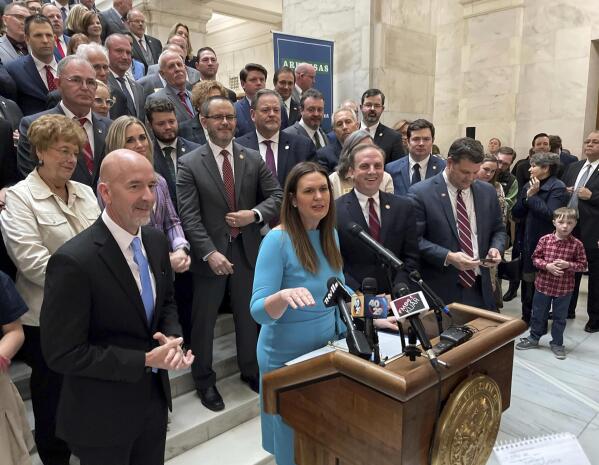Arkansas Gov. Sanders proposes raises, vouchers in bill
LITTLE ROCK, Ark. (AP) — Arkansas Gov. Sarah Huckabee Sanders proposed on Wednesday an overhaul of the state’s schools that will pair a 39% raise in starting teacher pay with a new voucher program that will direct public money to pay for private and home schooling.
Sanders also said the bill, which she’s called her priority in this year’s legislative session, will include limits on how race and sex are taught in schools. Sanders outlined the details of the legislation a day after the former White House press secretary delivered the Republican rebuttal to President Joe Biden’s State of the Union Address.
“This is the most substantial overhaul of our state’s education system in Arkansas history, and frankly, it couldn’t come soon enough,” Sanders said at a news conference at the state Capitol with Republican lawmakers. “The longer we wait to reform our failing schools, the more future generations we’re condemning to a lifetime of poverty.”
Sanders’ proposal calls for raising starting teacher salaries in the state from $36,000 a year to $50,000. The move follows calls by lawmakers from both parties to raise the starting pay, which is one of the lowest in the country.
Sanders’ proposal includes a laundry list of initiatives opposed by Democrats and teachers’ advocacy groups, including an “education freedom account” for private and home schooling that she said will be phased in over three years. The accounts will be equal to about 90% of the state’s per-student funding for public schools, which is currently about $7,300.
Similar statewide savings account programs exist in Arizona and West Virginia, and they’ve been proposed in a dozen other states this year.
Sanders said the bill will put into law an executive order she signed hours after taking office last month that prohibited public schools from teaching critical race theory. The governor said the legislation will also include restrictions similar to a Florida law that forbids instruction on sexual orientation and gender identity in kindergarten through third grade. Critics have called that measure Florida’s “Don’t Say Gay” law.
Democrats, who have proposed a standalone teacher raise bill, said the increase should be considered separately rather than attached to other initiatives backed by Republicans.
“You lump everything into that kind of a bill and even if there are some things we’d like to support or could support, we just can’t do it because we believe the voucher part of it is going to be a systematic dismantling of the public school system in Arkansas,” Democratic Rep. Tippi McCullough, the House minority leader, told reporters.
The proposal also faces resistance from some Republicans who have expressed concerns about the impact diverting public money to private schools could have.
“What we’re going to do is we’re going to create a system of have and have-nots,” Republican Rep. Jim Wooten, who has opposed past “school choice” efforts. Wooten said he supports raises for teachers and would rather vote on it separately.
Supporters of the measure defended combining all of the proposals into one omnibus bill.
“If you piecemeal it out in several different bills and some of those bills don’t pass, then you don’t have comprehensive education reform,” said Republican Sen. Breanne Davis, who will be the lead Senate sponsor of the legislation.
The bill has yet to be filed, so many details remain unknown. Sanders’ office later said other parts of the legislation would repeal the Teacher Fair Dismissal Act and provide for 12 weeks of paid maternity leave.
Sanders said the package will cost $300 million in the first year, with half of that new spending.
Sanders said the bill will also include student loan forgiveness for new teachers who commit to teach in areas of highest need, and up to $10,000 in performance-based bonuses. She also proposed new programs aimed at improving literacy, including sending 120 “reading coaches” to schools and $500 tutoring grants for students not meeting reading benchmarks in kindergarten through 3rd grade.




